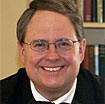Commentary on Acts 1:6-14
Though Luke 24:51 intimates it, Acts 1:9 is the only place in the New Testament that graphically depicts the Lord’s ascension.
The surrounding text is a semicolon between two exclamation points: Jesus’ resurrection (Luke 24:1-49) and subsequent forty days of his appearances (Acts 1:3), and the Day of Pentecost on which the church is dramatically anointed by the Holy Spirit (Acts 2:1-47). Befitting a semicolon, this Sunday’s lection invites a pause for contemplation, perhaps for course-correction. For a welcome change let’s not just do something. Let’s stand there.
After coming together, as Jesus’ followers must (Acts 1:6, 13-14), they ask him a question that, like many of our own ever since, reveals them staring into a rearview mirror: “Lord, is this the time when you will restore the kingdom to Israel?” In other words: Will the enemies occupying our land and our aspirations now be routed? Will the Lord at long last declare our independence? (See, for instance, Psalm 20; Joel 2:30-3:21; Zech 8:1–11:17; Luke 21:7-9; 24:21.) They continue to equate political fulfillment and personal benefit with God’s kingdom (Luke 19:11). The church’s learning curve is steep: To this day some confused Christians do the same. Again comes the Lord’s correction, still piercing the anxiety-mongering, bestselling Gnosticism of Left Behind: “It is not for you to know the times or periods that the Father has set by his own authority” (Acts 1:7; also Mark 13:32; Luke 12:40; 17:22-24). The question of Jesus’ disciples and his response is echoed in this text’s conclusion. There, instead of driving in reverse, they gaze upward and are brought up short by two men dressed in white (Acts 1:10-11; cf. Luke 24:4-7): What’s the point of staring into heaven? When it’s time for God’s celestial envoy to return to earth, that event should be altogether conspicuous (Acts 1:11; Luke 21:25-28; Rev 1:7). Meanwhile the church is charged with responsibility that can be fulfilled only by looking forward, not backward or upward.
The Lord’s charge comes with a promise: “You will receive power when the Holy Spirit has come upon you; and you will be my witnesses in Jerusalem, in all Judea and Samaria, and to the ends of the earth” (Acts 1:8). Skittish about evangelism, most of us find Luke’s equivalent of Matthew’s great commission (Matt 28:18-20) unnerving. Welcome aboard: The apostles of Acts reacted likewise (Acts 9:8-9, 13-14, 26; 10:14-16; 11:1-3; 15:6-7a). The Risen One unfolds the map his disciples will follow (Jerusalem: 2:14–8:3; Judea and Samaria: 8:4-25). To what “the ends of the earth” refers–the outermost reaches of the inhabited world (like Ethiopia: 8:26-40), the Gentiles’ conversion (10:1-11:18), the gospel’s delivery to Rome (28:11-31), or something beyond the story in Acts–is (a) unanswerable and (b) small spuds. Plainly this mission originates in Judaism’s heart and splays outward, transgressing all boundaries and their attendant prejudices. The church is not a club with a voluntary code for elite insiders. Like-minded propaganda existing only to underwrite our comfort zone is no gospel at all.
Apostles being what they are–blessed yet fractured messengers–the Lord’s marching orders would be terrifying, nay impossible, apart from his assurance that the power to obey lies not in themselves but rather in a bona fide God-given energy: the same Holy Spirit that has owned the stage from the beginning of Luke’s drama. This is the Spirit that has filled John the baptizer (Luke 1:15), overshadowed Mary (1:35), stirred Elizabeth (1:41), unstopped Zechariah (1:67), and inspired Simeon (2:25-26). The Lord’s Spirit has anointed Christ himself (3:22; 4:1, 18). If Jesus needed and received Holy Spirit, then his emissaries can and should depend on God’s faithfulness to deliver all necessary wherewithal. On Pentecost (Acts 2:1-42) that is exactly what will happen. On this day, with this promise, Mary the mother of Jesus has returned (1:14). Let the church learn from her how to respond: “Here am I, the servant of the Lord; let it be with me according to your word” (Luke 1:38).
Just what is expected of Spirit-endowed apostles? To be witnesses (martyres) of Jesus (Acts 1:8; also 2:32; Luke 24:48). This is sine qua non for a disciple of this Lord. In spite of its manifold later connotations, its particular expression is not uniform. It entails preaching for some, though not for most. It literally costs the life of some martyrs, though not that of everyone. For us all John V. Taylor may have gotten it right:
To engage in the mission of God, therefore, is to live this life of prayer: praying without ceasing, as St Paul puts it, that is to say, sustaining a style of life that is focused upon God. This is indeed to engage in the mission of the Holy Spirit by being rather than by doing. To realize that the heart of mission is communion with God in the midst of the world’s life will save us from the demented activism of these days (The Go-Between God [1973] 227 [emphasis added]).
If for some that feels like sticky piety, too loosely engaged with the world’s suffering, let us remember that Christ, the Lord to whom the church testifies, resisted diabolical temptations (Luke 4:1-13; 22:31), exploded religious parochialism (4:23-30; 10:29-37), cast out demons (4:31-37; 8:26-39), healed the sick (4:38-39; 8:42b-48), supped with sinners (5:29-32; 19:1-10) and forgave their sins (5:20; 7:36-50), preached blessing on the poor and woe to the rich (6:20-26), defied politicians (13:31-33; 22:66–23:12), and realigned warped visions of God’s kingdom (14:1-18:14). Jesus even raised the dead (7:11-17; 8:49-56) and died merciful and righteous to the end (23:26-49). Every aspect of his life patterned that to which the whole church testifies. He accomplished nothing, however, apart from prayerful communion with God (3:21; 5:16; 6:12; 9, 28-29; 22:41). Neither did his earliest apostles (Acts 1:24; 9:11, 40; 10:9; 13:3; 20:36). And neither can we (Luke 6:28; 11:1-2; 18:1; 22:40, 46).

May 4, 2008